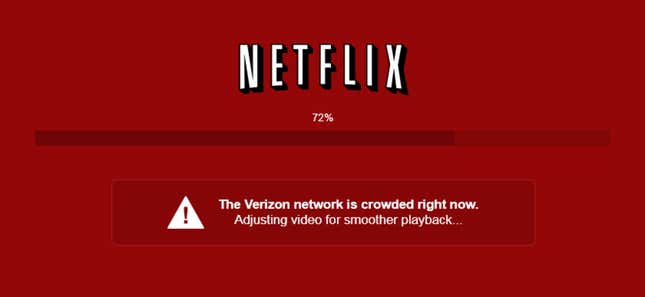
Verizon just sent a letter—full text below—demanding that Netflix stop blaming it for congested internet traffic that leads to poor video quality. Netflix, in a statement also pasted below, said it would continue testing the error message.
(The message, seen above, is not specific to Verizon; an AT&T customer has also spotted a version targeting his internet provider.)
Here’s the full text of Verizon’s letter from Randal Milch, the company’s general counsel, to his counterpart at Netflix, David Hyman:
Dear David,
An article posted yesterday on Quartz (qz.com) reveals that Netflix is displaying “error messages” to customers that blame the customer’s Internet service provider (ISP) for purported connectivity issues. The article contains an image allegedly captured by a Netflix customer while watching a Netflix video on his computer using his Verizon Internet access service. The image states that “(t)he Verizon network is crowded right now. Adjusting video for smoother playback…”
There is no basis for Netflix to assert that issues with respect to playback of any particular video session are attributable solely to the Verizon network. As Netflix knows, there are many different factors that can affect traffic on the Internet, including choices by Netflix in how to connect to its customers and deliver content to them, interconnection between multiple networks, and consumer in-home issues such as in-home wiring, WiFi, and device settings and capabilities.
Indeed, in the first instance, responsibility for its customers’ experience falls squarely on Netflix itself. Netflix has the ability to directly connect to every broadband network in America should it choose to do so. Instead, as described in a recent entry on the Internet Phenomena Blog, Netflix relies on a panoply of content-distribution and other middle-man networks to reach its customers, trying to lower its costs as much as possible? The cost/quality trade-off is one Netflix has chosen. Netflix has been aware for some time that a few Internet middlemen have congestion issues with some IP networks and nonetheless, Netflix has chosen to continue sending its traffic over those congested routes. To now accuse last-mile ISPs of being solely responsible for service issues that may relate to congestion on peering circuits stemming from network arbitrage by upstream providers is self-serving, deceptive, inaccurate and an unfair business practice.
Netflix’s false accusations have the potential to harm the Verizon brand in the marketplace. This potential harm is broader than only the experience of a customer viewing Netllix content. The impression that Netflix is falsely giving our customers is that the Verizon network is generally “crowded” and troublesome. This could cause a customer to think that any attempted viewing of video, whether it be Hulu, YouTube or other sites, would yield a similarly “crowded” experience, and he or she may then choose to alter or cease their use of the Verizon network. This potential damage to Verizon, because of Netflix delivery decisions must be factored in to Netflix’s deceptive behavior. The fact is that Netflix’s characterizations run directly counter to other, publically-available information that highlights the reliability and consistency of Verizon’s broadband services. For example, in testing performed by the Federal Communications Commission as part of its Measuring Broadband America program, Verizon’s service consistently delivers speeds well in excess of advertised speeds, even during peak busy hour.
In light of this, Verizon demands that Netflix immediately cease and desist from providing any such further “notices” to users of the Verizon network. We further demand that within five days from the date of this letter that Netflix provide Verizon with any and all evidence and documentation that it possesses substantiating Netflix’s assertion to Mr. Yuri Victor that his experience in viewing a Netflix video was solely attributable to the Verizon network, and that Netflix also provide a list of all Netflix customers on the Verizon network to whom Netflix has delivered such messages with the date and time that each such message was displayed for each user and the purported substantiation for it. Failure to provide this information may lead us to pursue legal remedies, and Verizon reserves all rights in that regard.
Finally, as you know, our two companies recently completed a long-term, strategic agreement to bring Netflix content directly onto the Verizon network for the mutual benefit of both our customers. I sincerely hope this is not a harbinger of things to come in terms of how Netflix treats its network partners and our mutual customers.
Sincerely,
Randal S. Milch
Executive Vice President
Public Policy General Counsel
Verizon Communications Inc.
And here is Netflix’s response:
This is about consumers not getting what they paid for from their broadband provider. We are trying to provide more transparency, just like we do with the Netflix ISP Speed Index, and Verizon is trying to shut down that discussion.
We are testing ways to let consumers know how their Netflix experience is being affected by congestion on their broadband provider’s network. At present, we are testing in the U.S. in areas serviced by many broadband providers. This test started in early May and it is ongoing.
Our test continues.